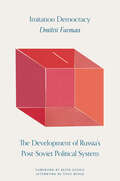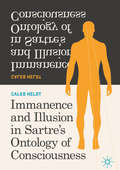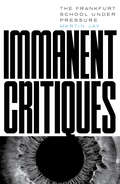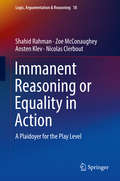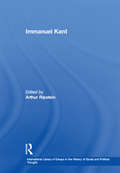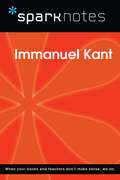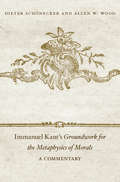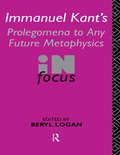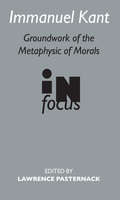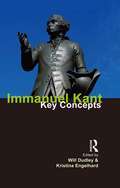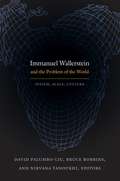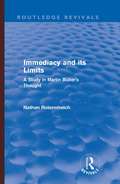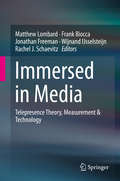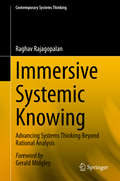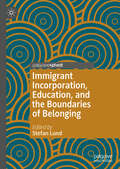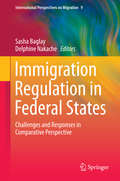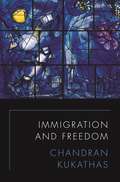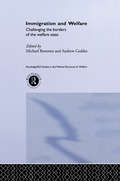- Table View
- List View
Imitation Democracy: The Development of Russia's Post-Soviet Political System
by Dmitrii FurmanExamines the history and functioning of Russia's post-Soviet political system–an &“imitation democracy&”After the collapse of the Soviet Union, Russia under Yeltsin and Putin implemented a political system of &“imitation democracy,&” marked by &“a huge disparity between formal constitutional principles and the reality of authoritarian rule.&” How did this system take shape, how else might it have developed, and what are the prospects for re-envisioning it more democratically in the future?These questions animate Dmitrii Furman&’s Imitation Democracy, a welcome antidote to books that blandly decry Putin as an omnipotent dictator, without considering his platforms, constituencies, and sources of power. With extensive public opinion polling drawn from throughout the late- and post-Soviet period, and a thorough knowledge of both official and unofficial histories, Furman offers a definitive account of the formation of the modern Russian political system, casting it into powerful relief through comparisons with other post-Soviet states.Peopled with grey technocrats, warring oligarchs, patriots, and provocateurs, Furman&’s narrative details the struggles among partisan factions, and the waves of public sentiment, that shaped modern Russia&’s political landscape, culminating in Putin&’s third presidential term, which resolves the contradiction between the &“form&” and &“content&” of imitation democracy, &“the formal dependence of power on elections and the actual dependence of elections on power.&”
Immanence and Illusion in Sartre’s Ontology of Consciousness
by Caleb HeldtThis book is a critical re-evaluation of Jean-Paul Sartre’s phenomenological ontology, in which a theory of egological complicity and self-deception informing his later better known theory of bad faith is developed. This novel reinterpretation offers a systematic challenge to orthodox apprehensions of Sartre’s conceputualization of transcendental consciousness and the role that the ego plays within his account of pre-reflective consciousness. Heldt persuasively demonstrates how an adequate comprehension of Sartre’s theories of negation and reflection can reveal the world as it appears to human consciousness as one in which our reality is capable of becoming littered with illusions. As the foundation upon which the rest of Sartre’s philosophical project is built, it is essential that the phenomenological ontology of Sartre’s early writings be interpreted with clarity. This book provides such a reinterpretation. In doing so, a philosophical inquiry emerges which is genuinely contemporary in its aim and scope and which seeks to demonstrate the significance of Sartre’s thought, not only as significant to the history of philosophy, but to ongoing debates in continental philosophy and philosophy of mind.
Immanent Critiques: The Frankfurt School under Pressure
by Martin JayThe Frankfurt School&’s own legacy is best preserved by exercising an immanent critique of its premises and the conclusions to which they often led. By distinguishing between what is still and what is no longer alive in Critical Theory, these essays seek to demonstrate its continuing relevance in the 21st century.Fifty years after the appearance of The Dialectical Imagination, his pioneering history of the Frankfurt School, Martin Jay reflects on what may be living and dead in its legacy. Rather than treating it with filial piety as a fortress to be defended, he takes seriously its anti-systematic impulse and sensitivity to changing historical circumstances. Honouring the Frankfurt School's practice of immanent critique, he puts critical pressure on a number of its own ideas by probing their contradictory impulses.Among them are the pathologization of political deviance through stigmatizing "authoritarian personalities," the undefended theological premises of Walter Benjamin's work, and the ambivalence of its members' analyses of anti-Semitism and Zionism. Additional questions are asked about other time-honored Marxist themes: the meaning of alienation, the alleged damages of abstraction, and the advocacy of a politics based on a singular notion of the truth.Rather, however, than allowing these questions to snowball into an unwarranted repudiation of the Frankfurt School legacy as a whole, the essays also acknowledge a number of its still potent arguments. They explore its neglected, but now timely analysis of "racket society," Adorno's dialectical reading of aesthetic sublimation, and the unexpected implications of Benjamin's focus on the corpse for political theory. Jay shows that it is a still evolving theoretical tradition which offers resources for the understanding of–and perhaps even practical betterment–of our increasingly troubled world.
Immanent Reasoning or Equality in Action: A Plaidoyer For The Play Level (Logic, Argumentation And Reasoning Ser. #18)
by Shahid Rahman Nicolas Clerbout Zoe McConaughey Ansten KlevThis monograph proposes a new way of implementing interaction in logic. It also provides an elementary introduction to Constructive Type Theory (CTT). The authors equally emphasize basic ideas and finer technical details. In addition, many worked out exercises and examples will help readers to better understand the concepts under discussion.One of the chief ideas animating this study is that the dialogical understanding of definitional equality and its execution provide both a simple and a direct way of implementing the CTT approach within a game-theoretical conception of meaning. In addition, the importance of the play level over the strategy level is stressed, binding together the matter of execution with that of equality and the finitary perspective on games constituting meaning.According to this perspective the emergence of concepts are not only games of giving and asking for reasons (games involving Why-questions), they are also games that include moves establishing how it is that the reasons brought forward accomplish their explicative task. Thus, immanent reasoning games are dialogical games of Why and How.
Immanuel Kant
by Andrews Reath Mary GregorThis is the first English translation of all of Kant's writings on moral and political philosophy collected in a single volume. No other collection competes with the comprehensiveness of this one. As well as Kant's most famous moral and political writings, the Groundwork to the Metaphysics of Morals, the Critique of Practical Reason, the Metaphysics of Morals, and Toward Perpetual Peace, the volume includes shorter essays and reviews, some of which have never been translated before. There is also an English-German and German-English glossary of key terms.
Immanuel Kant
by Manfred Kuehn Robert B. LoudenIn this two-volume collection, Klemme (Institut fr Philosophie, Otto-von-Guericke Universitt) and Kuehn (philosophy, Purdue U. ) present some of the best discussion of Kant in English, i. e. those selections which are either classics or deserve to be classics. Volume I, 25 essays, discusses his theoretical philosophy. Although a small section is devoted to the concept of teleology, the main focus is upon the transcendental aesthetic and logic rather than upon the dialectic. Volume II, 25 essays, deals with aspects of his practical philosophy such as the moral, the political, the philosophy of law and history, the highest good and the philosophy of religion, and Kant in context. The original essays, written between 1937 and 1996, are reproduced in full. Lacks a subject index. Annotation c. Book News, Inc. , Portland, OR (booknews. com)
Immanuel Kant (International Library of Essays in the History of Social and Political Thought)
by Arthur RipsteinKant casts a long shadow over contemporary debates in political philosophy. The Kantian roots of ideas of dignity, autonomy, equality and freedom under law are widely acknowledged. Kant’s own developments of those ideas in his explicitly political writings are taken up less frequently. The aim of this volume is to help bring those contributions out of the shadows. The articles and essays explore various dimensions of Kant’s complex and powerful picture of the relation between morality and politics that Kant develops.
Immanuel Kant (SparkNotes Philosophy Guide)
by SparkNotesImmanuel Kant (SparkNotes Philosophy Guide) Making the reading experience fun! Created by Harvard students for students everywhere, SparkNotes is a new breed of study guide: smarter, better, faster. Geared to what today's students need to know, SparkNotes provide:Chapter-by-chapter analysis Explanations of key themes, motifs, and symbols A review quiz and essay topics Lively and accessible, these guides are perfect for late-night studying and writing papers.
Immanuel Kant's Groundwork for the Metaphysics of Morals: A Commentary
by Immanuel Kant Allen W. Wood Dieter SchöneckerA defining work of moral philosophy, Kant's Groundwork for the Metaphysics of Morals has been influential to an extent far beyond what its modest length (roughly 75 pages) might suggest. It is also a famously difficult work, concerned with propounding universal principles rather than answering practical questions. As even professional philosophers will admit, first-time readers are not alone in finding some of its arguments perplexing. Offering an introduction that is accessible to students and relevant to specialized scholars, Dieter Schönecker and Allen Wood make luminously clear the ways the Groundwork for the Metaphysics of Morals forms the basis of our modern moral outlook: that all human beings have equal dignity as ends in themselves; that every rational being is a self-governing agent whose morality freely derives from his or her own will; and that all rational beings constitute an ideal community, bound only by the moral laws they have agreed upon. Schönecker and Wood explain key Kantian concepts of duty, the good will, and moral worth, as well as the propositions Kant uses to derive his conception of the moral law. How the law relates to freedom, and the significance of the free will within Kant's overall philosophy are rigorously interrogated. Where differing interpretations of Kant's claims are possible, the authors provide alternative options, giving arguments for each. This critical introduction will help readers of the Groundwork gain an informed understanding of Kant's challenging but central philosophical work.
Immanuel Kant's Groundwork for the Metaphysics of Morals: A Commentary
by Dieter SchöneckerA defining work of moral philosophy, Groundwork for the Metaphysics of Morals has been highly influential and famously difficult. Dieter Schönecker and Allen Wood make clear the ways this work forms the basis of our modern moral outlook and how moral law relates to freedom and free will within Kant's overall philosophy.
Immanuel Kant's Prolegomena to Any Future Metaphysics in Focus (Philosophers in Focus)
by Beryl LoganThis collection of seminal essays on the Prolegomena provides the student of philosophy with an invaluable overview of the issues and problems raised by Kant. Starting with the Carus translation of Kant's work, the edition offers a substantive new introduction, six papers never before published together and a comprehensive bibliography. Special attention is paid to the relationship between Kant and David Hume, whose philosophical investigations, according to Kant's famous quote, first interrupted Kant's 'dogmatic slumber'.
Immanuel Kant: Anthropology, History, and Education
by Immanuel Kant Günter Zöller Robert B. LoudenAnthropology, History, and Education, first published in 2007, contains all of Kant's major writings on human nature. Some of these works, which were published over a thirty-nine year period between 1764 and 1803, had never before been translated into English. Kant's question 'What is the human being?' is approached indirectly in his famous works on metaphysics, epistemology, moral and legal philosophy, aesthetics and the philosophy of religion, but it is approached directly in his extensive but less well-known writings on physical and cultural anthropology, the philosophy of history, and education which are gathered in the present volume. Kant repeatedly claimed that the question 'What is the human being?' should be philosophy's most fundamental concern, and Anthropology, History, and Education can be seen as effectively presenting his philosophy as a whole in a popular guise.
Immanuel Kant: Groundwork of the Metaphysics of Morals in Focus (Routledge Philosophers In Focus Ser.)
by Lawrence PasternackThe Groundwork of the Metaphysics of Morals^ is one of the most important works of moral philosophy ever written, and Kant's most widely read work. It attempts to demonstrate that morality has its foundation in reason and that our wills are free from both natural necessity and the power of desire. It is here that Kant sets out his famous and controversial 'categorical imperative', which forms the basis of his moral theory.This book is an essential guide to the groundwork and the many important and profound claims that Kant raises. The book combines an invaluable introduction to the work offering an exploration of these arguments and setting them in the context of Kant's thinking, along with the complete H.J Paton translation of the work, and a selection of six of the best contemporary commentaries. It is the ideal companion for all students of Kantian ethics and anyone interested in moral philosophy. _ _ _
Immanuel Kant: Key Concepts (Key Concepts)
by Kristina Engelhard Will DudleyImmanuel Kant is among the most pivotal thinkers in the history of philosophy. His transcendental idealism claims to overcome the skepticism of David Hume, resolve the impasse between empiricism and rationalism, and establish the reality of human freedom and moral agency. A thorough understanding of Kant is indispensable to any philosopher today. The significance of Kant's thought is matched by its complexity. His revolutionary ideas are systematically interconnected and he presents them using a forbidding technical vocabulary. A careful investigation of the key concepts that structure Kant's work is essential to the comprehension of his philosophical project. This book provides an accessible introduction to Kant by explaining each of the key concepts of his philosophy. The book is organized into three parts, which correspond to the main areas of Kant's transcendental idealism: Theoretical Philosophy; Practical Philosophy; and, Aesthetics, Teleology, and Religion. Each chapter presents an overview of a particular topic, while the whole provides a clear and comprehensive account of Kant's philosophical system.
Immanuel Kant: Theoretical philosophy, 1755-1770
by David WalfordThis is the first volume of the first ever comprehensive edition of the works of Immanuel Kant in English translation. The eleven essays in this volume constitute Kant's theoretical, pre-critical philosophical writings from 1755 to 1770. Several of these pieces have never been translated into English before; others have long been unavailable in English. We can trace in these works the development of Kant's thought to the eventual emergence in 1770 of the two chief tenets of his mature philosophy: the subjectivity of space and time, and the phenomena-noumena distinction. The volume has been furnished with substantial editorial apparatus, including a general introduction to the main themes of Kant's early thought, introduction to the individual works and résumés of their contents, linguistic and factual notes, bibliographies, a glossary of key terms, and biographical-bibliographical sketches of persons mentioned by Kant.
Immanuel Wallerstein and the Problem of the World: System, Scale, Culture
by Bruce Robbins David Palumbo-Liu Nirvana TanoukhiIn this collection of essays, leading cultural theorists consider the meaning and implications of world-scale humanist scholarship by engaging with Immanuel Wallerstein's world-systems analysis. The renowned sociologist developed his influential critical framework to explain the historical and continuing exploitation of the rest of the world by the West. World-systems analysis reflects Wallerstein's conviction that understanding global inequality requires thinking on a global scale. Humanists have often criticized his theory as insufficiently attentive to values and objects of knowledge such as culture, agency, difference, subjectivity, and the local. The editors of this collection do not deny the validity of those criticisms; instead, they offer Wallerstein's world-systems analysis as a well-developed vision of the world scale for humanists to think with and against. Scholars of comparative literature, gender, geography, history, law, race, and sociology consider what thinking on the world scale might mean for particular disciplinary practices, knowledge formations, and objects of study. Several essays offer broader reflections on what is at stake for the study of culture in decisions to adopt or reject world-scale thinking. In a brief essay, Immanuel Wallerstein situates world-systems analysis vis--vis the humanities. Contributors. Gopal Balakrishnan, Tani E. Barlow, Neil Brenner, Richard E. Lee, Franco Moretti, David Palumbo-Liu, Bruce Robbins, Helen Stacy, Nirvana Tanoukhi, Immanuel Wallerstein, Kren Wigen
Immediacy and its Limits: A Study in Martin Buber's Thought (Routledge Revivals)
by Nathan RotenstreichOriginally published in 1991, this book focuses on a major problem in the philosophy of Martin Buber. This is the topic of immediacy which is presented in terms of the contact between human beings on the one hand, and man and God on the other. The basic theme throughout is whether the I-Thou relation refers to immediate contact between human beings, as Buber saw it, or whether that relation is something established or aspired to. This is an important study which should be consulted in any future discussion of Martin Buber’s thought. At the same time, it raises critical issues for recent European philosophy. Students of philosophy, and religious and social thought will find its critical exposition extremely helpful.
Immersed in Media
by Jonathan Freeman Matthew Lombard Frank Biocca Wijnand Ijsselsteijn Rachel J. SchaevitzHighlights key research currently being undertaken within the field of telepresence, providing the most detailed account of the field to date, advancing our understanding of a fundamental property of all media - the illusion of presence; the sense of "being there" inside a virtual environment, with actual or virtual others. This collection has been put together by leading international scholars from America, Europe, and Asia. Together, they describe the state-of-the-art in presence theory, research and technology design for an advanced academic audience. Immersed in Media provides research that can help designers optimize presence for users of advanced media technologies such as virtual and augmented reality, collaborative social media, robotics, and artificial intelligence and lead us to better understand human cognition, emotion and behaviour.
Immersive Systemic Knowing: Advancing Systems Thinking Beyond Rational Analysis (Contemporary Systems Thinking)
by Raghav RajagopalanThis book advances systems thinking by introducing a new philosophy of systemic knowing. It argues that there are inescapable limits to rational understanding. Humankind has always depended on extended ways of knowing to complement the rational-analytic approach. The book establishes that the application of such methods is fundamental to systemic practice. The author advocates embracing two modes of consciousness: intentionality, which Western philosophy has long recognized, and non-intentional awareness, which Eastern philosophy additionally highlights. The simultaneity of these two modes of consciousness, and the variety of knowings they spawn are harnessed for a more holistic, systemic knowing. Four practices from fields related to systems thinking are examined: two contemporary action research methodologies from the US and the UK; the Sumedhian (Indian) approach to inquiry about processes within groups; and a technique of group psychotherapy originating in Eastern Europe. Each of these systematically harnesses knowing using both modes of consciousness. Therefore, the author insists, such approaches must be included in systemic practice, in purposeful and methodical juxtaposition to rational-analytic ways. The book provides examples and guidelines for deployment.“All researchers and practitioners of systems thinking and action research must read this book...Raghav has craftfully blended Eastern and Western wisdom. He uses his immersion into Eastern ways of knowing practically, to elaborate the systems philosophy in rich detail. He has incorporated, from cooperative inquiry as action research, the idea of four ways of knowing: practical, propositional, presentational and experiential, to bolster the foundations of systems thinking”―SHANKAR SANKARAN, Professor, University of Technology Sydney, Australia; President International Society of Systems Sciences (ISSS) 2019-2020“This is a book with the potential to stimulate the emergence of a new paradigm. Raghav shows that systems thinking can transcend rational analysis and incorporate other ways of knowing, such as arts-based methods… also, rather than be overly preoccupied with striving for change, there is value in simply abiding, which comes with a deep appreciation of the ecological relationships we are part of. It’s not that rational analysis is wrong – it’s that it is only part of a genuinely transformative practice”. ―GERALD MIDGLEY, Co-Director, Centre for Systems Studies, University of Hull; former President, ISSS (2013-14)“Raghav Rajagopalan’s writing on generating deep appreciation for the social and ecological interdependencies ties in closely with my own work. The philosophical ideas he develops contain the tracings and essential tones of Gregory Bateson’s idea of "Mind" as a process of living complexities reaching well beyond the notion of the body. This book demonstrates outstanding erudition and deep compassion at the same time. It should delight the adventurous reader unafraid of big questions”.―NORA BATESON, President of the International Bateson Institute
Immigrant Incorporation, Education, and the Boundaries of Belonging
by Stefan LundIn this edited volume, authors analyze how symbolic boundaries of belonging are negotiated and reflected upon by school actors in different educational contexts and how that contributes to a richer understanding of the ways in which "we-ness" acts as a fundamentally structuring force in immigrant incorporation. The analyses draw on cultural sociologist Jeffrey Alexander's work on civil sphere theory, thus grasping both the solidaristic dimensions of incorporation and processes of exclusion. Chapters are guided by two major themes: school choice/ethnic school segregation and religion/faith in schooling. Both of these themes provide rich examples of how immigrant school actors negotiate the symbolic codes that define boundaries of belonging/non-belonging in different communities. This focus will broaden the understanding of how educational practices and formal schooling works in relation to immigrant incorporation into different school cultures, as well as in the Swedish civil sphere.
Immigration Dialectic
by Harald BauderImmigration is an integral part of national identity in settler societies such as Canada. But in countries where identity is defined more in ethnic terms, such as Germany, the presence of immigrants has only recently begun to be acknowledged. Taking these two countries as case studies, Immigration Dialectic explores the impact of immigration on national identity as imagined through media-based discourse.Harald Bauder argues that while both countries rely on negative depictions of immigrants to construct a positive image of the self, the ways in which Canada and Germany construct national identity in relation to representations of immigrants are significantly different. Bauder introduces a sophisticated framework of Hegelian dialectics for the growing interdisciplinary literature regarding media perspectives on immigration and national identity. Providing close analysis of themes such as belonging, economic impacts, and national security, Immigration Dialectic will appeal to anyone interested in contemporary discussions on immigration.
Immigration Regulation in Federal States
by Sasha Baglay Delphine NakacheThe book examines the phenomenon of immigration federalism: its main characteristics, why and how it has developed, its implications for immigration systems (in general) and non-citizens' rights (in particular). The book introduces the reader to theoretical perspectives on immigration federalism through three sets of literature - federalism, governance and non-citizens' rights - that provide a necessary framework for understanding immigration federalism's multiple facets and impacts. It also offers an analysis of immigration federalism through case studies of six jurisdictions: Australia, Canada, Germany, Switzerland, the EU and the US. Despite increased sub-national activity in immigration regulation in several federal states, very little research has been dedicated so far to comparing how federal states deal with immigration federalism. Comparative studies on the human rights implications of immigration federalism have received even less attention. This book seeks to fill the gap in this area and is an important contribution to the field, providing the reader with a better understanding of the complex issues surrounding immigration federalism and its impact on non-citizens.
Immigration and Freedom
by Chandran KukathasA compelling account of the threat immigration control poses to the citizens of free societies Immigration is often seen as a danger to western liberal democracies because it threatens to undermine their fundamental values, most notably freedom and national self-determination. In this book, however, Chandran Kukathas argues that the greater threat comes not from immigration but from immigration control.Kukathas shows that immigration control is not merely about preventing outsiders from moving across borders. It is about controlling what outsiders do once in a society: whether they work, reside, study, set up businesses, or share their lives with others. But controlling outsiders—immigrants or would-be immigrants—requires regulating, monitoring, and sanctioning insiders, those citizens and residents who might otherwise hire, trade with, house, teach, or generally associate with outsiders. The more vigorously immigration control is pursued, the more seriously freedom is diminished. The search for control threatens freedom directly and weakens the values upon which it relies, notably equality and the rule of law. Kukathas demonstrates that the imagined gains from efforts to control immigration are illusory, for they do not promote economic prosperity or social solidarity. Nor does immigration control bring self-determination, since the apparatus of control is an international institutional regime that increases the power of states and their agencies at the expense of citizens. That power includes the authority to determine who is and is not an insider: to define identity itself.Looking at past and current practices across the world, Immigration and Freedom presents a critique of immigration control as an institutional reality, as well as an account of what freedom means—and why it matters.
Immigration and Welfare: Challenging the Borders of the Welfare State (Routledge Studies In The Political Economy Of The Welfare State Ser.)
by Andrew Geddes Michael BommesImmigration and Welfare avoids simplistic and unhelpful notions of the 'threat' of immigration to analyse the effects of immigration on national welfare states in an integrating Europe. It explores new migration challenges, such as asylum seekers and Europe's increasingly restrictive immigration policies, and looks at the implications of such debat
Immigration and the Challenge of Education
by Nathalia E. JaramilloAnalyzes a community from the standpoint of immigrant mothers in South Central Los Angeles who were concerned about the education of their children and the violence in their communities. Written in Spanish and English, the text brings together the women's observations as they put into action their developing political consciousness.
